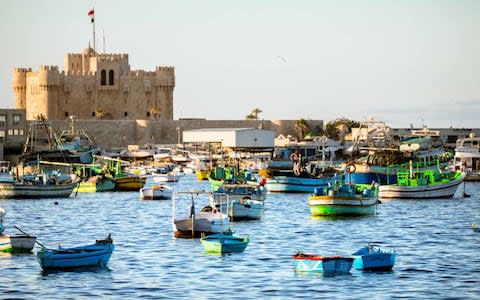Troubled times have no borders – so it's time we returned to Egypt
![Cairo: unflustered on a recent visit - Tomasz Kowalski (Tomasz Kowalski (Photographer) - [None]](https://s.yimg.com/ny/api/res/1.2/I2aaqq9OOIjPCm9_yib7nQ--/YXBwaWQ9aGlnaGxhbmRlcjt3PTk2MDtoPTYwMQ--/https://media.zenfs.com/en-GB/homerun/the_telegraph_818/ebfea59375c13631d24e9770f99f6c09)
Two weekends ago, I climbed into a car on the west bank of the river Nile in Cairo, and embarked on what I knew might be a dangerous journey. It was 6am when I stepped out of the hotel, but the morning smog that often cloaks the Egyptian capital was already there, scratching at my every breath.
An hour later, the visibility was no better on the desert highway towards Alexandria – though, this time, the culprit was a blanket of fog; a weather phenomenon so rare in Egypt that my driver admitted he had never dealt with it before. The same was apparently the case for many of the other road users, as the sudden slammings-on of brakes demonstrated, all 130 miles (210km) of the way to the Mediterranean.
But danger beyond this? Well no, not so much. Certainly, none of the danger that a close friend had hinted at when I’d revealed I would be spending a few days in two of North Africa’s biggest cities. “Egypt,” he’d said, “isn’t that a bit, well, you know?”
He didn’t attempt to complete his sentence – but then, he didn’t need to. Egypt has been regarded by the travelling public as “a bit, well, you know” for a while now. Since the first flushes of 2011, in fact, and the pro-democracy demonstrations of the Arab Spring – which sparked a chain of events that seemed to deliver much of the Arabic-speaking world not so much into some sun-kissed political April as an ongoing winter of discontent.
Egypt has fared better than some of its neighbours in the subsequent near-decade (the situations in Syria and Libya need no comment here), but it has also suffered. Unrest has ebbed and flowed, presidents have come and gone – and the incumbent of the top job, Abdel Fattah el-Sisi, is arguably no more removed from dictatorial tendencies than some of his predecessors. In the meantime, there has been violence – a suicide bomb in central Cairo’s Khan el-Khalili bazaar killed three people as recently as Feb 19. Incidents like this have had an inevitable impact on tourism – 15 million people visited the country in 2010; only 5.3 million did so in 2016.

And yet, a fortnight ago, I discovered nothing so unstable. Alexandria was a sea-facing slice of heaven on a Saturday afternoon – flowers sprouting across the ruins of its ancient Serapeum temple; families at tables overlooking the waves in Fish Market, a restaurant on the Corniche. Cairo was no more flustered.
True, its traffic is as chaotic as ever, but when I waited in the long queue (some things do not change) outside the Egyptian Museum on the Friday morning, I had to remind myself that I was standing feet away from a becalmed Tahrir Square – the centreground of the 2011 revolution.
Is Egypt more dangerous to visit than it was a decade ago? Possibly – the Foreign and Commonwealth Office (FCO) currently warns against all travel to the upper half of the Sinai peninsula, and the beach resorts of Sharm el-Sheikh have effectively been off limits to UK holidaymakers since 2015 due to a ban on UK-based airlines flying into its airport.

But do we live in a world that receives its bulletins of fear and despair more quickly, and in more appalling detail, than it did even 20 years ago? Definitely. As last week’s terrorist atrocities in Christchurch demonstrated again, bad news travels faster than ever before – not waiting for newspaper editions and on-the-hour TV news, but leaping straight to your phone.
So what to do? Stop travelling and stay at home? Well, no – the terror attacks in London and Manchester in the past two years have proved that troubled times have no borders. Cling to familiar destinations? Paris, Berlin and New York have all witnessed well-publicised traumatic episodes. Would we steer clear of any of them on safety grounds? Probably not. Why should Egypt be different?

The good news is that opinion seems to be shifting. Visits by UK tourists to Egypt were up 39 per cent last year (compared with 2017). Many of those headed to the Red Sea retreats of Hurghada and Marsa Alam (not subject to FCO concerns). And yet, my Cairo hotel was full of British (and American) accents, dissecting the joys of the Pyramids.
These voices will surely grow more numerous when the Grand Egyptian Museum – a new Giza showcase for all that heritage – opens next year. The biggest restrictions to travel – but the most easily overcome – are the ones we place on ourselves.

